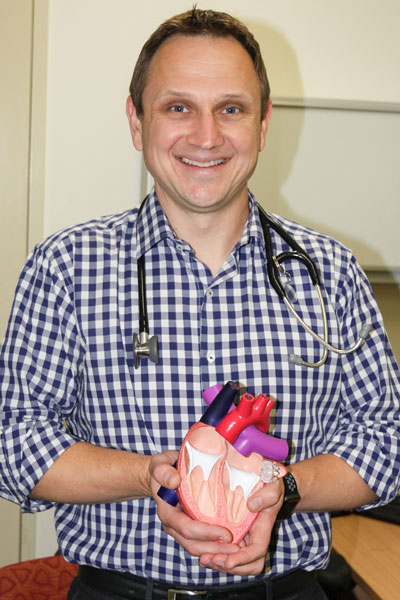
The Prince Charles Hospital Interventional Cardiologist Dr Dale Murdoch cares for many broken-hearted patients each year
How love and loss affects our hearts
This year, dozens of Queenslanders will find themselves in The Prince Charles Hospital cardiology ward under strict observation following a rushed trip to the ED with chest pain and shortness of breath.
They’ll show electrocardiogram abnormalities just like a heart attack, but in fact, they just need rest under the watchful eyes of specialists – they’re being treated for a broken heart.
The Prince Charles Hospital Interventional Cardiologist Dr Dale Murdoch cares for many broken-hearted patients each year, where the left ventricle of their heart has weakened due to severe emotional distress.
Dr Murdoch said there is however good news, and just as we often tell our recently dumped friends that ‘time heals all wounds’ – in most cases like this, time really does heal, and the patient simply needs to be monitored while they rest, take some medicine and recover.
“Takotsubo syndrome, also known as Broken Heart Syndrome, was first discovered in Japan in the early 1990s and it is where a heart attack is replicated due loss, grief or other intense emotional pain,” Dr Murdoch said.
“Our bodies do process heartache just the same as they do physical pain, and we get a release of chemicals to the brain that can cause us to have that ‘heavy’ heart feeling when we are upset, or in some cases, intense chest pain from what we know is Broken Heart Syndrome.
“Many patients pass through our ward each year with this syndrome, most commonly effecting females over the age of 50 years of age.
“We always treat our patients with this syndrome as we would any other emergency, as the heart muscle can become weak – but in most cases these patients recover in a matter of weeks with no major damage, so this is a great outcome.”
So, can you die of a broken heart? Dr Murdoch says in some cases, yes, although it’s very unlikely.
“It is possible to die of a broken heart, albeit extremely rare. Heart attacks can be triggered by stress and strong emotions, so if one does experience a dreadful life event and have an underlying condition or other factors affecting the heart, there could be complications,” he said.
“However, when it comes to matters of the heart, we can see positive flow-on effects from our emotions too, such as the release of adrenaline which circulates in the blood stream and can make our heart race when we are excited to be around someone or ‘in love’.
“It’s part of our fight or flight response, but the good thing is that when we feel love, we get a release of oxytocin and dopamine too so we feel happier and our blood pressure can actually lower and reduce cardiovascular stress.”
So as we approach Valentine’s Day this weekend it’s important to remember, both physical and metaphorical heartache does and will heal.
